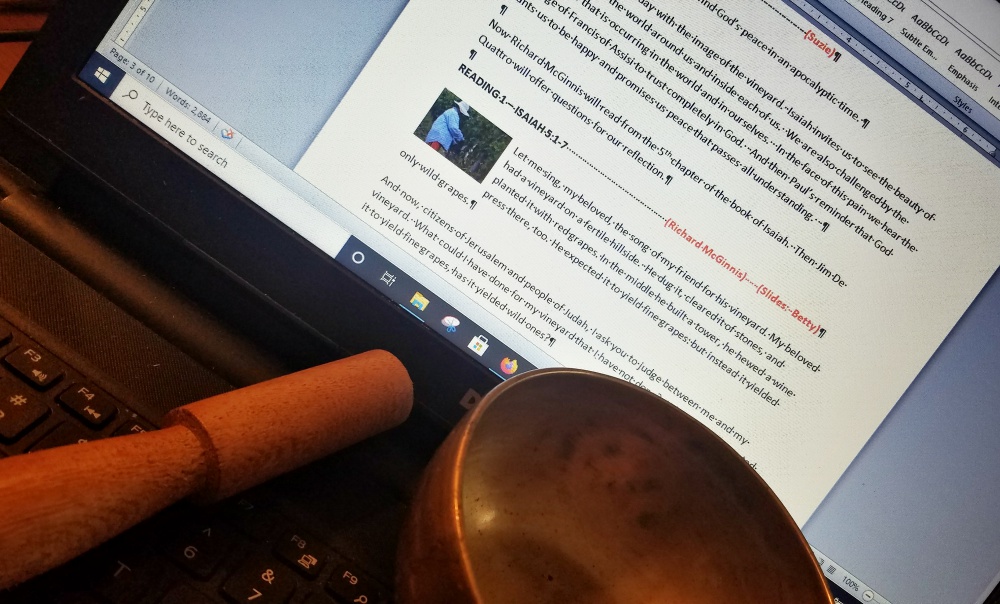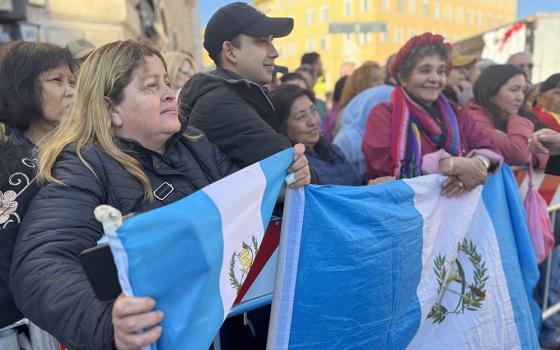
The script for speakers and those with musical roles at Solidarity with Sisters' Oct. 4 gathering, with the singing bowl the group uses to end silences (Betty D. Thompson)
Have you noticed the people of God inventing new ways to gather in these past seven months? Some new groups are small, while FutureChurch gathers thousands. I offer my experience, hoping that amid COVID-19, the Spirit is surprising and enlivening us. We urgently need this vitality in order to be a healing Gospel presence in our aching, splintered world.
It started simply. A small group I'm part of, Solidarity with Sisters, decided in February to share communal contemplative time during Lent. During our eight-plus years as companions with the Leadership Conference of Women Religious, transformation has happened through personal relationships and through LCWR's contemplative, engaged way of being with God, with one another, with us and with the world. (Our chapter in LCWR's 2018 book, However Long the Night, tells our story.) We decided that this Lent, we would both invite others into our weekly contemplative times and be "visiting contemplatives" with similar groups nearby.
The plan worked for one week face-to-face. Then the coronavirus shut everything down.
Our contemplative space moved to Zoom. One member suggested that we try a Sunday morning Zoom gathering, again inviting others. That first Sunday of two dozen local folks has become a joyful, reflective weekly gathering. People invite friends, and now about 60 regularly come from a dozen states and the District of Columbia, with new people arriving most weeks. Small groups gather during the week for Zoom contemplative prayer. Looking inward and outward, we see God among us, and we see ways to be peace and justice in the world.
Each Sunday for about an hour, we gather on Zoom, sing and listen to readings that include some of the Sunday Scriptures. We invite reflection with questions and silence. Then, many people give voice to personal awareness that emerged in the quiet. Those insights flow into community prayers, an offering of ourselves, a recognition of our communion in Christ, the Our Father in union with the whole church, and a closing blessing and song.
Week by week, different planners take the lead, and fresh experiences arrive among us. New words to familiar prayers. Onscreen art. Quotes from sisters and saints, poets and modern prophets. Action options, like parish food drives, a sister parish in Haiti, eco-ministry, and racial justice initiatives.
Unlike Mass at most churches and completely unlike livestreamed Mass, we now gather facing each other, all on equal footing, all listening, all welcome to speak. For me, it's hard to imagine returning to a worship situation where most people have no voice except in formal responses. In the midst of pandemic and turmoil, our gatherings deepen my relationship with the church of Christ and push me to choose how to be bread for the world.
Sunday readings that I ponder in community spill into the whole week, carrying the weight of others' varied reflections about scriptural import here and now. Old and new relationships deepen as I glimpse more of the fullness of each person in the intimacy of prayers and reflections. I am keenly aware of us striving to be the body of Christ — and not alone, but connected with you and with the whole church.
Advertisement
I reflect on what Eucharist means. My experience echoes what St. Joseph Sr. Christine Schenk describes in "Being Eucharist in a Time of Pandemic." She quotes the "Eucharistic letter" (circa 1660) of the Congregation of St. Joseph: "The Holy Sacrament is a mystery of union. ... This Eucharistic Jesus unites all creatures to himself and to God ... that all may be one."
Schenk writes: "The deepest meaning of Eucharist, therefore, implies breaking open the bread of our lives — as Jesus did — for the life of the world. We are called to live a Eucharistic life, not just receive sacramental communion."
Our Sundays don't end with a formal "Thanks be to God," but maybe that's why I'm writing this: to thank God out loud for the work of the Spirit among us in community. Many faith practices have nourished me through the years, but nothing equals this contemplative, communal, persistent, creative grounding in God.
In a time of anxiety and turmoil, the work of helping to coordinate our group's efforts has kept values front and center in my life and has kept me sane. Our group hopes always to follow the prophetic way that we experience with women religious. They put their energy into being the change they want to see. Contemplatively, communally, they practice mercy, justice, neighborliness, solidarity and peace. They entrust the outcome to God. This way of being can give light to the world.
What happens next, when the COVID-19 situation changes? I have no idea. But "next" is nowhere in sight, so I don't need an answer.
Maybe it's contagious, this "being church" experience? A person 800 miles away stopped coming to our gatherings because she realized her base community could try something similar. I wonder about other small groups like ours. Could we wake to one another?
LCWR itself inspires me as a model. LCWR relationships, structures and processes nurture a community of communities in Christ, ever-evolving, striving to be responsively present to one another and to the world. I dream of our whole church knowing itself as a community of communities.
In our Zoom gatherings, we have often used a prayer that Solidarity with Sisters has valued since the 2019 LCWR assembly, using excerpts from Holy Cross Sr. Sharlet Wagner:
It is not ours to see the future. Our task is not to create a plan for the new to emerge. It is to create a space for the new to emerge. For the young. For the growing diversities. A space where the Holy Spirit is free to work. If we can do this, the future will emerge. And it will be good.
If we don't do this, a different future will emerge. We are urgently needed. And so we continue to pray: Come, Holy Spirit, fill the hearts of your faithful and kindle in us the fire of your love. Send forth your Spirit, and we shall be created, and you shall renew the face of the Earth. May it be so.
[Betty D. Thompson takes care of the online presence for Solidarity with Sisters, a D.C.-area lay group of companions with the Leadership Conference of Women Religious and Catholic sisters.]






